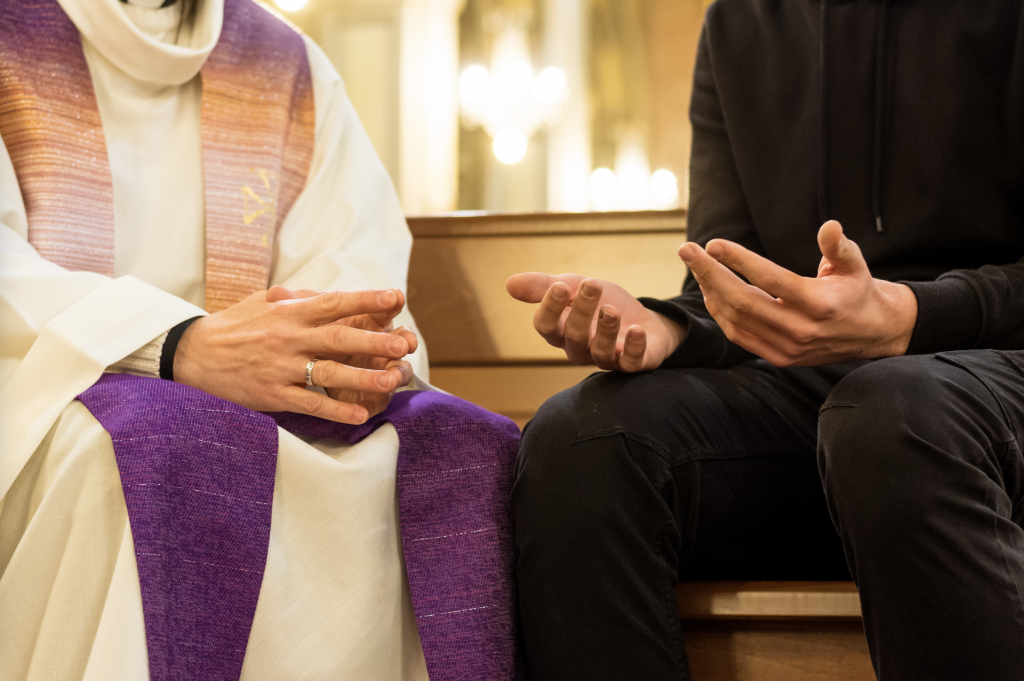My Wednesday nights are filled with Zoom, youth ministry, and — dread. Don’t get me wrong; I love this stuff. I love that young people are not quite adults, and the masks they wear can’t quite hide their true selves.
What I love about youth ministry is also what I dread about it. There is a truth in young adults, a vulnerability, that is hard to look in the eyes. I feel like the Israelites, not ready to look upon the glory of God in the face of Moses (Exodus 34:35).
As a priest, the easiest way to avoid a young person’s inner glory is to be the “Catholic Answer Guy,” the person young adults come to with their questions about the Catholic faith: “Hey Father, why can’t we just confess our sins directly to God? Hey Father, why do we have more books in our bibles than non-Catholic Christians?”
Sometimes we train our young people to treat priests this way. And, if I’m honest, when I’m treated as the One-Who-Knows-It-All, I get to feel great about myself. The problem is, I know it’s a veil.
Jesus said he has revealed the mysteries of the kingdom to the childlike and hidden them from the wise and learned (Matthew 11:25). He also said that because the kingdom belongs to the childlike, you must become like a child to enter it (Mark 10:15; Matthew 18:3), and that when you receive a child you receive Christ himself (Matthew 19:15, 18:3–5). That means to connect with these young people I have to go there — I must drop my own veil to reveal my hidden child.
This is, in a sense, what priesthood is all about — allowing myself to be covered as God’s beloved in prayer with Christ, so that I can stay unveiled (1 Corinthians 15:53–54). If I do that, those I minister to and me can be free to gaze on the glory of the Lord in one another’s unveiled faces. It was Christ who tore the veil on the cross. He exchanged the pain, mess, and brokenness that we all hide inside, “for the very righteousness of God” (2 Corinthians 5:21).
During a recent Zoom ministry session, one youth asked me what I’ve been up to. I told him the truth: I’d been eating Cheetos. It’s all I had at the moment. I asked them to share something they’d been up to.
There was silence, the uncomfortable kind in which you feel like you need to do something to fill the space. It feels messy, like I’m not in control, which I don’t like. But silence is also a holy space — it’s where we wait for the Lord.
In jumped our youth minister, feeling responsible for ensuring the conversation didn’t get off track.
Because our ministers are responsible for supervising so many young people, we have formed them to be the “adults in the room,” even though they are only a few years older than the youth to whom they are ministering. Acting like adults, or “adulting,” is the occupational hazard of youth ministry.
The use of “adult” as a verb has become common parlance. “To adult” means “to have your life under control.” Young people “adult” when they go to bed early to wake up for work or invest in a 401(k). Many associate these milestones with bragging rights; in church ministry, it means we get our chance to be “good Catholics.”
But the truth is that everyone’s life is in some stage of utter collapse. This isn’t a shameful thing. It’s not something to be fixed or healed, covered by a mask or a list of achievements. It’s just reality. And to pretend is unwise.
We fall over ourselves trying to keep our crosses hidden from one another, and especially from young people. The result is that everyone feels like they are “the only ones” alone with their crosses. What we really need is to be ourselves.
Before the ministers or I had the chance to redirect our conversation on Zoom, a young woman talked openly about her struggles in training as a long-distance runner. It was simple but beautiful, something genuine. As Jesus promised, the “little ones” can teach us what God wants us to know: We don’t have to be anything less than his glorious children, the ones whose unveiling of all creation awaits (Matthew 18:6; Romans 8:19).

